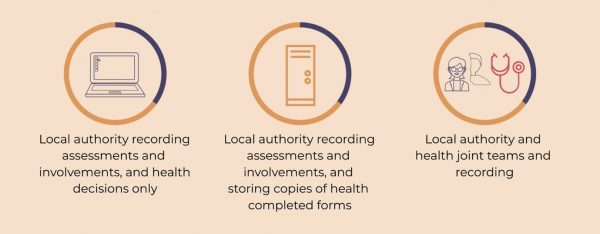
By Chris Sweeney, adult social care lead at Liquidlogic
Fragmented working across health and social care teams can often lead to a lack of oversight in cases, not to mention the duplication of time spent entering data. Liquidlogic has developed a continuing healthcare module to combat these issues and support both health and social care teams in viewing progression of cases and to stop information being lost down any health and social care gaps.
The solution is based on Liquidlogic’s proven assessment, workflow and workspace technology and is configurable to facilitate either sole use by the local authority where appropriate, or joint use with health partners.
Standard continuing healthcare forms are built into the Liquidlogic Adults’ Social Care System (LAS) Workflow. These include:
- NHS continuing healthcare checklist;
- Fast track tool;
- NHS decision support tool and MDT recommendation;
- Continuing healthcare plan

Why Liquidlogic?
- Joint working: The Liquidlogic continuing healthcare (CHC) module is designed to support joint working between health and social care. The CHC module can be used exclusively in either social care or in health, but the tangible benefit is gained from both parties’ use of the Liquidlogic CHC. Contributions can be seen from each party, resulting in more efficient processing of cases and making chasing status updates a thing of the past. When used collaboratively, the module supports joint contributions to assessments as well as real-time correspondence between parties via case notes.In addition to this, there are also significant advantages for working in partnership, particularly where there are issues with mental capacity or deprivation of liberty, or where safeguarding enquiries are required, again improving collaboration and information sharing.
- A single solution for social care, funded nursing care & continuing healthcare: Over time, a person may move in and out of these areas. Use of a single system facilitates the review of a person’s entire care history in one place. It also reduces the risk of a person falling through the gaps that are present where separate systems are used – using a single system allows for these transitions in status to be work flowed between teams and prioritised accordingly, to ensure that continuous service provision is maintained and funding attributed in a timely manner.Using a single solution also reduces the risk of personal information becoming out of date, while a person is being dealt with in a different part of the process. The Liquidlogic CHC module ensures that the same questions are not repeatedly asked and reduces the administrative burden.
- Services: In many areas, services commissioned under continuing healthcare or funded nursing care (FNC) are from the same service providers which have already been commissioned by the local authority to meet social care needs – and in fact, many FNC services are commissioned jointly by health and social care. By using a single solution, the service can be commissioned out of the local authority’s contract’s structure and funding apportioned as appropriate.
- Spine and Shared Care Record access: Liquidlogic has already integrated with the Spine and with Shared Care Records in the social care sector. The same levels of integration are available with the CHC module.
- Security: While information sharing is important and at the heart of the CHC project, the Liquidlogic Adults’ Social Care System is designed to be multi-tenanted from a security perspective. There are specific data and application access rights, from which role-based profiles can be defined and assigned to users.
Summary
There are many advantages to linking health and social care support. Continuing healthcare is a critical area of focus for each sector. Tangible benefits include time savings, a consolidated view of the progress of cases and security aspects.
Liquidlogic is holding a webinar on June 28th to look at specific use cases for the CHC module. To register, click here.


 Family help: one local authority’s experience of the model
Family help: one local authority’s experience of the model  ‘I spent the first three months listening’: how supportive leadership can transform children’s services
‘I spent the first three months listening’: how supportive leadership can transform children’s services  How senior leaders in one authority maintain a culture of excellence
How senior leaders in one authority maintain a culture of excellence  How staff support ensures fantastic outcomes for children and families
How staff support ensures fantastic outcomes for children and families  Workforce Insights – showcasing a selection of the sector’s top recruiters
Workforce Insights – showcasing a selection of the sector’s top recruiters 

 Facebook
Facebook X
X LinkedIn
LinkedIn Instagram
Instagram
Comments are closed.